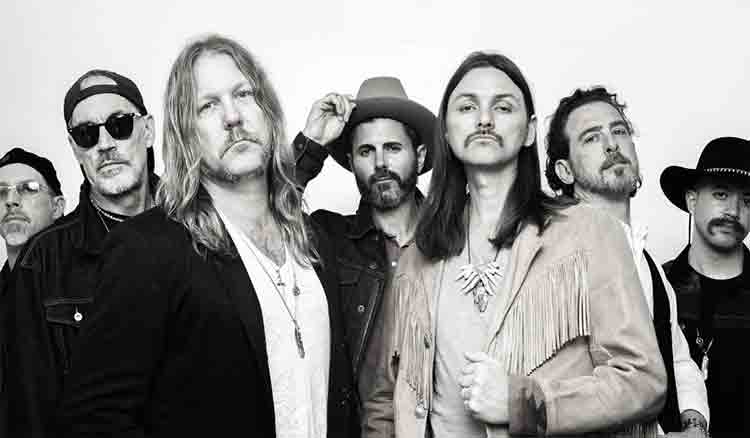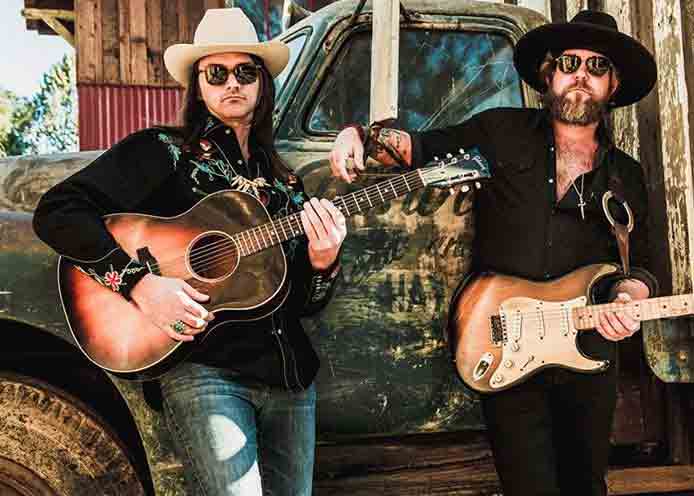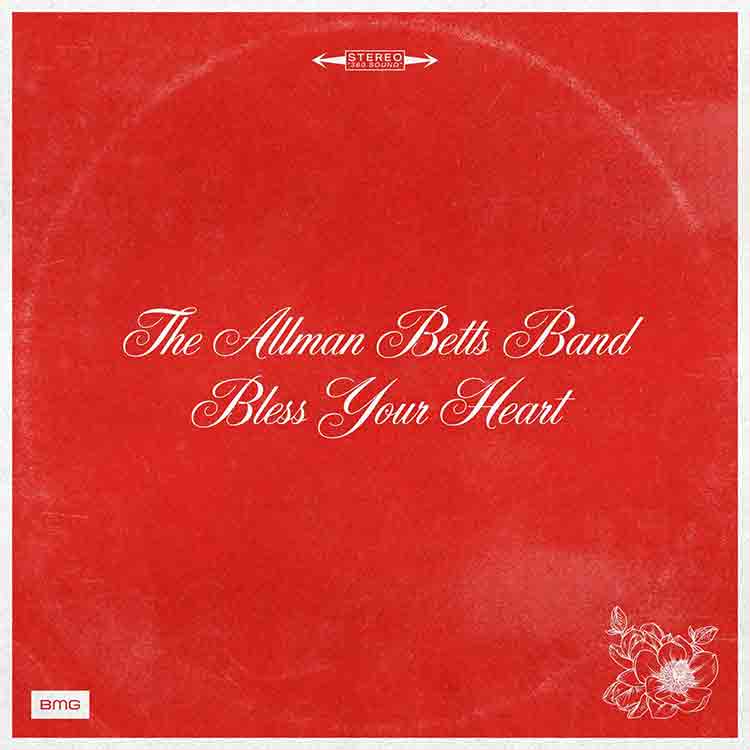
Devon – son of Gregg Allman, and
Duane – son of Dickey Betts are at the core of
The Allman Betts Band, with album
‘Bless Your Heart’ shaping up to be one
of the finest of 2020.
Alongside the Grateful Dead, the Allman Brothers have claim to be the great American Band of the seventies. Check out the singles chart and there’s not much evidence of that. The easy “Ramblin’ Man” – ‘I was born in the backseat of a Greyhound bus rolling down Highway 41’, with Dickey Betts guitar and vocals about ‘trying to make a livin’ and doing the best I can’, was a US ‘Billboard’ no.2 on Capricorn records in August 1973. It was lifted from the group’s fourth studio album ‘Brothers And Sisters’ (August 1973), completed after the death of Duane Allman. Then Gregg Allman’s slinky solo take on the band’s “Midnight Rider” peaked at no.19 in January 1974 – lifted from his own debut ‘Laid Back’ (October 1973) studio set, which also catches restless movement, ‘one more silver dollar’, riding, desperation and the yearning to escape. Yet even the band’s albums were initially slow to catch fire. Both ‘The Allman Brothers Band’ (November 1969) and ‘Idlewild South’ (September 1970) were slow burners that only went gold when they were repackaged as ‘Beginnings’ and reissued in 1973. It was the live double-album ‘At Fillmore East’ (July 1971) that provided their mainstream breakthrough, capturing the full magic of their onstage chemistry.
As with the Grateful Dead, it was as a hard-touring live band that the Allmans built their tribal following and cult reputation. And there’s an argument that this might just be the best that Rock ‘n’ Roll ever aspired to. Check out the live YouTube clip of them playing “Jessica” – the purely-instrumental second single from ‘Brothers And Sisters’, albeit from a 1982 Florida Bandshell concert, and the dual-lead guitar interplay flows as clean as country water and wild as mountain dew, with jazz levels of band cohesion, dexterity and interaction. The Allmans took all the root-music forms of America, soul-ripping Blues, the sweetest Country, relentless Boogie and the supernatural freedoms of jazz improvisation and time signatures, and poured it out with seemingly effortless ease. This is the point at which all these strands came more perfectly together in slippery synergy.
But this text is not about the Allman Brothers Band then. It is about the Allman Betts Band now.

Watch Duane Betts take lead on that same “Jessica” – his father’s composition, with the Allman Betts Band live at Lowell Summer Series during the June of 2019, or at the Pennsylvania State Theatre, with a solid line of guitars, striking rapid-profile poses in cowboy hats, and listen to those grumbling mumbles about the vicinity of apples falling from trees. Do we doubt? Weighted heavy with unrealistic expectations, the consensus on The Next Generation of Rock Stars is still very much up for debate. Do we have reservations? Surely a degree of considered suspicion is the only rationally healthy response
Yet “Magnolia Road” is their majestic lead single from CD or double-vinyl package ‘Bless Your Heart’ (BMG, August 2020), with its semi-autobiographical vocal-lines shared by Duane Betts and Devon (son of Gregg) Allman – ‘my old man said this before, got to aim for what you’re looking for,’ ironic in that this is the album’s one song solely authored by band-collaborator Stoll Vaughan, ‘never waste your time, for the days are long but the years fly by.’ The video is old-style cartoon animation – not digital imaging, of the band playing a huge festival, with dancing hippie-chick crowds in headbands and dreads, playing Frisbee, having sex in the shrubbery and rolling pass-around joints. Not exactly retro, more a timelessly renewing rite-of-passage that could relate to just about any American decade since the sixties. And that’s the first key. Then check out the helicopter circling the skies above the festival site, referenced ‘GLA 47-17’ – that is Gregory LeNoir Allman 1947-2017. Which is memory, and continuity.
“Pale Horse Rider” opens the album with big dramatic swathes of crashing chiming guitar chords building into ‘a thousand miles just don’t lead you anywhere anymore, a hundred signs placed there to confuse you,’ ominously evolving into a dark and dense tumble accentuated by an unbridled storm of guitars, evoking the spirit of Neil Young’s Crazy Horse or their upgraded counterpart, My Morning Jacket. Then “Carolina Song” – a gospel intensity of wailing Soul back-up voices, with guitar interplay as deep and profound as eternal truth, building into long intricate instrumental play-outs. There’s shimmering slide and Stonesy straight-ahead ass-kicking boogie rhythms to “King Crawler”, complete with honking sax, then mournful harmonica haunting a landscape where horses run free on “Ashes Of My Love” – ‘you say I’ve got a wild heart, can’t be tamed by love,’ a warning, he’s a waster, a loser, don’t waste your time on him, he’s ‘made the desert my friend, buried bones along the way,’ a mourning motif of romance and wreckage, flecked with trail-dust harmonica to complement the cinematic ‘Badlands’ spook. But it’s the instrumental “Savannah’s Dream”, running to a full 12:04-minutes of dancing electric keyboard, the kind of rattling slithering percussion that crawls up and down your spine like a diamondback, and dual guitar duetting that most obviously assumes the Allman Brothers mantle, improvisations defined by sharp stuttering punctuations.
How do you deal with legacy? How is it possible to top what’s already been done? For the band members, there are other rich histories. This line-up was never a case of port of first refuge. A third but very necessary personnel-link is provided by bass-player Berry Duane Oakley Jr, son of Allman’s founding bassist Berry Oakley. Yet he’d already honed his chops playing with Tommy Roe’s Romans, former Door’s Robby Krieger Band and as part of Bloodline with Joe Bonamassa. While Devon had forged his own creative identity through two albums and European tours with Honeytribe, as well as stints with the Royal Southern Brotherhood. Admittedly, Duane had guested onstage with the legacy Allmans for its ‘Woodstock ‘94’ festival appearance, but by then he’d already played with Oakley in Backbone69, and with Alex Orbison – son of Roy, as Whitestarr.
Maybe the DNA gravitational pull of constellations aligning is simply too massive to resist? The music-history and friendship between the three – Devon, Duane and Berry, traces back to the 1989 Allman Brothers Band’s Twentieth anniversary summer tour where they first met, and often sat-in with the onstage musicians. The partnership between Devon and Duane firmed at the huge December 2017 San Francisco Fillmore family tribute show to mark what would have been Gregg Allman’s seventieth birthday. Betts then went on to play opening sets for the year-long 2018 Devon Allman Project world tour, guesting for a musical nudge to their respective fathers for each of a hundred nights. After the tour, yielding to the inevitable, the two officially pact, calling in Berry Oakley to be the third leg of the new band.
Debut album ‘Down To The River’ (June 2019), is the first time the full seven-piece Allman Betts Band line-up had played – as well as recorded together, with producer Matt Ross-Spang helming sessions at the same historic Alabama ‘Muscle Shoals Sound Studio’ where Duane Allman had once played session-work for Aretha Franklin, Wilson Pickett and Percy Sledge plus the Derek And The Dominoes’ ‘Layla’ project (all those iconic licks aren’t necessarily by ‘Slowhand’ Clapton). The band try out their take on Tom Petty’s “Southern Accents” – ‘there’s a southern accent, where I come from, the young ‘uns call it Country, the Yankees call it dumb, I got my own way of talkin’, but everything is done, with a southern accent, where I come from.’ There’s one by the late Chris Williams (“Autumn Breeze”). The rest are band originals, with Stoll Vaughan – a singer-songwriter from Los Angeles (via Kentucky), collaborating on five of the nine tracks. The very atmospheric monochrome video for Betts-Vaughan’s excellent “Shinin’” opens like a ‘Dukes Of Hazzard’ outtake with Devon and Duane in a Good Ole Boys roadside stand-off, ‘we gotta jam, it’s been too long’ and ‘let’s do it!’… They head off to the old Cotton Mill rehearsal studio where Berry is telling the rest of the band ‘so when the verse kicks in we want to be nice and solid in the groove there and kind of settle in till Duane starts singing. Then kinda keep an eye on wherever they’re going and keep an eye on when that bridge comes around again.’ A useful glimpse into the band’s collective working process. They tour ‘Down To The River’ relentlessly through the year, from sold-out US theatres in spring – Baton Rouge, Louisiana and Tybee Island, Georgia, Chicago, Illinois and Charlotte, North Carolina, upscaling to festival dates in summer, then crossing the Atlantic for a string of European dates.
All the while there was a growing stash of new songs, fuelled by road-forged camaraderie and their generous sleight-of-hand with three-chord tricks, scribbled down in hotel rooms or riding the tour bus between dates. They re-enlist Stoll Vaughan to help shape the material, and book a window at Muscle Shoals, with Matt Ross-Spang to reprise his role. Ahead of the studio dates they decamp to Nashville for rehearsals, fleshing out the new songs until satisfied with them. ‘We thought if we can maximize the potential of each song, then we have a shot at making a cohesive, great record,’ says Devon. Under a siren’s warning of approaching tornados, they were soon secure in the familiar, single-story brick-house Muscle Shoals hospitality. Recording thirteen songs over a week’s time on two-inch tape, the dividends were immediate and plentiful, ‘once we got rolling, the floodgates opened’ comments Betts. Devon adds that after the ‘two-hundred races the horse had run… now we know how the band plays. We know to trust each other’s instincts. The dynamics have a flow to them, when to step back, when to push forward.’ Friends call around to help out, with guest contributions from Jimmy Hall, Shannon McNally, Art Edmaiston, Susan Marshall, and Reba Russell. There’s additional tracking in Memphis and St. Louis.
Musically the album evokes the group’s affection for The Band, or the Grateful Dead wrapped in Confederate flags, while drawing inspiration from their symbolic hometown – a place Devon calls ‘the United States of Americana’. And which the label’s PR calls a ‘conflagration of influences and invention, confidence and ambition… ragged and stomping. Heady and frayed. Soaring and scorching. Generational and genteel. West Coast scenes and Gulf Coast shores. Gateways of the Midwest and swamplands of Florida. Wyoming’s Big Sky. New York’s Big Apple. Chicago’s Broad Shoulders…’
As ‘Vox’ journalist Edwin Pouncey once astutely observed about an earlier reformation, ‘the emphasis on the new music they play so impressively together, is to retrace their original roots where Southern Rock and Country Blues are stirred together to create a highly intoxicating musical mint julep’ (October 1990). “Airboats And Cocaine” counts in to hard raw heavy rocking, with tongue firmly in cheek, a Southern Gothic tale of an everglade woman, pusher and supplier – ‘she was born right into the game’ on the wrong side of the track, while her guy regrets his incidental associations with the underbelly of swampland contraband, all wrapped up in a loose, mid-tempo sting. Then the “Southern Rain” that washes away guilt, pain and remorse, ‘almost fell, straight to hell’ – with the reassuring voices of the past. “Rivers Run” is a slower acoustic strum, ‘these are the stories we tell’ about trying to find the way back home, with an attractive ascending guitar figure. Berry makes his ABB vocal debut on his original song “The Doctor’s Daughter”, which has a kind of slow Plastic Ono Band piano echo feel to it. While Devon channels his baritone Colt 45 Johnny Cash vocal for “Much Obliged”, on a Bonnie And Clyde trip with the embedded double-edged ‘bless your heart’ message, open to nuanced interpretation. Clear through to closer track “Congratulations”, which reiterates the bitter theme of escape from small-town restrictions. To ask for more would be greedy.
The original Allman Brothers legend is a long-running epic of alcohol and substance abuse, crisis and tragedy, communal spirit and fall-out, high times and high-speed motorcycle death, drug-bust and betrayal, plus celebrity marriage (Gregg was married to Cher). It began in Nashville around the mid-sixties as The Allman Joys and then The Hour Glass, feeding classic Blues through a British invasion lens (covering the Yardbirds “Shapes Of Thing”) while Dickey Betts and Berry Oakley, were doing a similar thing with Second Coming (covering Cream’s “I Feel Free”) – while drummer friend Butch Trucks was playing with Thirty-First Of February. The mighty six-piece Allman Brother Band, twin guitars, twin drums, keyboard and bass emerged from the fusion of them all. The breakthrough ‘At Fillmore East’ double-set features a full “Whipping Post” weighing in at twenty-three minutes, in what critic Phil Sutcliffe calls ‘an overstretched piece of R&B jamming sustained by the phenomenal drum partnership of Trucks and Jaimoe ‘Johnny’ Johanson’ (‘Q’). A step ahead of the many basic Rock ‘n’ Blues, boogie and country roots bands who would go on to define the seventies.
Gregg became accidental focal-point following the deaths of guitarist-brother Duane and bassist Berry Oakley, both killed in motorcycle accidents within thirteen months of each other – and on the same stretch of Macon, Georgia road. In a masterstroke, Gregg replaced Duane with piano-player Chuck Leavell, freeing himself up to swap delirious solos with Betts and never get tangled up in painful memories. While Betts’ melodic songwriting also came more to the fore following the Tom Dowd-produced ‘Eat A Peach’ (1972). The band continued around the remaining nucleus, taking in spin-off solo projects, on and off through to century’s end. There were no tidy conclusions, they just kept keeping on. A story retold on their 1989 ‘Dreams’ four-CD (six-LP) box-set, a five-hour fifty-five track odyssey compiled by Bill Levenson from obscure demos, previously-unissued acetates and hard-to-get sources as well as all the expected career landmarks suspended in time, signposting some mythical Dixie turnpike. But more than that, more even than the songs, fretboards and riffs, the Allmans attuned to something deep in the southern cultural and subcultural psyche that resonated, and still resonates.
Can a generation brought up to stream its lifestyle soundtrack by the litre be seduced away by the lure of big black wheels of vinyl? ‘I think we definitely challenged ourselves, pushed ourselves artistically, and widened the spectrum on all levels’ says Betts. ‘We wanted something that was a little more sweeping. A deeper experience.’ ‘I hope what people hear on ‘Bless Your Heart’ is a band that’s having a love affair with being a band,’ adds Allman.
Of course, apples don’t fall far from applesauce. But this is not the New Allman Brothers Band. Because there’s no longer an old Allman Brothers Band. This is now. It’s not about legacy, it’s not about renewal or revival. It’s simply a continuity. And it blasts pretty-much everything else you’re liable to hear on Daytime radio clear out of the solar system.

BY ANDREW DARLINGTON
‘BLESS YOUR HEART’ (28 August 2020, BMG Records)
- Pale Horse Rider
- Carolina Song
- King Crawler
- Ashes Of My Lovers
- Savannah’s Dream
- Airboats And Cocaine
- Southern Rain
8. Rivers Run - Magnolia Road (the first single, released on all DSPs, June 19. The official music video for the track exclusively premiered via The ABB official YouTube channel the same day. Allman and Betts joined the premiere and chatted live with fans)
10. Should We Ever Part - The Doctor’s Daughter
- Much Obliged
13. Congratulations
The Allman Betts Band Line-up is Devon Allman (guitar, vocals), Duane Betts (guitar, vocals), Berry Duane Oakley (bass, vocals), Johnny Stachela (guitar, vocals), John Ginty (keyboards), R Scott Bryan (percussion, vocals), John Lum (drums)
